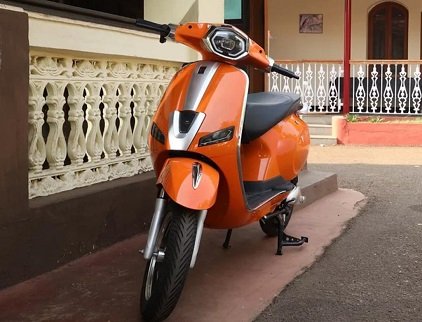Hyderabad, May 2022. Vayu Brand Electric Vehicles powered with LFP batteries provide the best thermal and cycle life, which results in superior safety over other batteries, said Amit Reddy, Founder of Hyderabad based Padmaja Greentech, EV Company, which manufactures “Vayu Motors” brand EV Vehicles.
Padmaja Greentech was founded by former Tesla executive Rani Srinivas and Entrepreneur Amit Reddy.
As frequent battery fires cast shadow on the EV industry, we would like to clear the air that our vehicles are the safest, Amit Reddy reiterated in a press note issued in Hyderabad today.
Our LFP cell-based platform has been powering 3 wheelers for over 4 years without any incident of battery fires or safety, in highly demanding applications. We are proud to introduce this technology into the 2 wheeler platform very soon and are confident that it would be setting a new benchmark in vehicle safety and reliability, Rani Srinivas, Co-Founder said.
LFP battery (Lithium Ferro Phosphate), is a type of lithium-ion battery. They are ideal for hot tropical conditions that prevail in India. They are not hazardous at high temperatures. They are high temperature and vibration resistant. They have a long life span. The cells have a life span of up to 2000 cycles and are up to 5 years. It is a safe battery technology. A report by Wood Mackenzie states that lithium-iron-phosphate (LFP) is poised to overtake lithium-manganese-cobalt-oxide (NMC) as the dominant stationary storage chemistry within the decade.
LFP batteries have an intrinsically safer cathode material than other batteries and do not decompose at higher temperatures. Amid growing concerns, lithium iron phosphate batteries which are nicknamed LFP batteries, use iron instead of nickel — have emerged as a safer alternative.
Battery Electric Vehicle pioneer Tesla Motors is also using LFP as a battery chemistry for its vehicles to overcome supply chain related issues.
With zero incidents, we would like to extend this technology into the 2 wheeler platform. Padmaja Greentech under the brand Vayu Motors aims to launch a scooter and a bike this year in the two-wheeler performance segment.
Padmaja Greentech is in talks to tie up with MG Automotive Pvt Ltd for contract manufacturing of their electric vehicles. MG AutomotivesPvt Ltd has been a veteran in bus bodybuilding for over 30 years. “This partnership helps us in variablising our fixed costs and also gives us access to MG’s deep knowledge in production and sourcing, making us asset light and de-risking the manufacturing process” said Amit Reddy.
MG Automotives is a large auto ancillary facility catering to the Bus Body requirements of Mahindra Trucks and Buses, Ashok Leyland Limited, APSRTC and the Private Customers.
Our city speed scooter, “Retro” is already sold in Telangana and we plan to launch a performance scooter and bike within the next six months. In the components division, our level 2 and 3 chargers are undergoing rigorous field testing and should be launched this year.” Amit Reddy added
Adds Dr Rajesh Perisamy, Vice President, Product Development in NMC cylindrical cells we noticed a loss of performance in warm conditions and also loss of energy and power density as cells are charged more than 500 times. LFP based battery packs have better thermal behaviour and lesser cycle fatique as compared to other chemistries. Precisely for this reason, we chose LFP pouch cells, which in our experience proved to be the safest form factor and chemistry for Indian applications. With the absence of nickel and cobalt, LFP has the advantages of being less prone to supply chain volatility as compared to other cell chemistries, giving us an advantage in the long term”.
Sharing more development in the company, Amit Reddy said that the company has been developing multiple products in the EV value chain. On the components vertical front, they are in the advanced stages of testing their level 2 chargers, which they claim complies with EV charging standards and is also been deployed at multiple locations for field validation. The level 3 DC fast chargers are under development and should be deployed by the year-end to facilitate charging in cars and buses. The company intends to deploy over 500 chargers by the year-end in Hyderabad.
